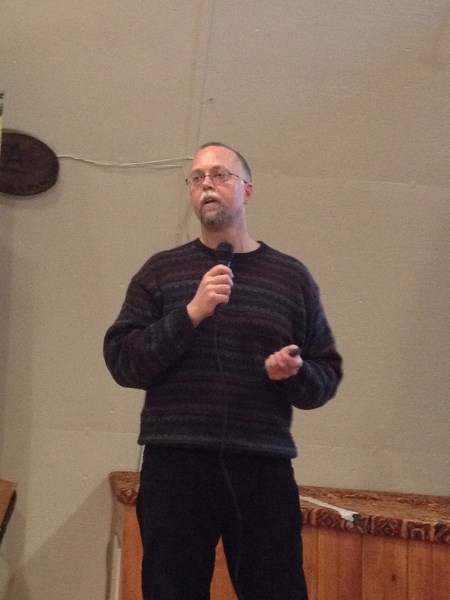Oil companies operating in the region must continue to seek out alternatives to using fresh or potable water in their fracking operations, an Alberta Energy Regulator (AER) official told a public meeting June 19.
Hosted by Sundre Petroleum Operators Group (SPOG) at the Bergen Hall, the open house saw several AER officials discuss oilpatch water use and site reclamation.
Claude Eckert, a hydrogeologist with the AER, explained that companies applying to use water in their operations need to make use of saline (salt) water and produced water (water brought up during drilling) before using potable water.
“We want the companies to look for alternatives to using fresh water,” said Eckert. “For enhanced oil recovering projects, they are required as part of their application process to look at saline water supply sources, produced water supply sources and waste water sources.
“They have to look at alternatives to fresh water sources first. If those sources are available in the area where there is (drilling) activity that should become their main source. If they need more water over and above that, then they can apply for fresh water.”
Although those same policy requirements have been in place since 2006, they only recently came under the authority of the new AER, he said.
“If they are going to submit an application for fresh water, they have to explain to us (AER) what they did to look for alternatives,” he said.
Each application is reviewed on a case-by-case basis, he said, noting that temporary diversion licences are also taken out by agriculture and other non-oilpatch users.
A revision of the provincial water conservation and allocation for oilfield injection policy is now underway to specifically address hydraulic fracturing, he said, noting that the updated policy could be ready for public release in January.
Water is used in hydraulic fracturing operations (also known as fracking) where it is pumped underground under pressure to break up rock formations to release oil and gas, which is then brought to the surface.
Fracking is a controversial practice, with critics saying it destroys fresh water and creates environmental concerns through its use of chemicals.
Jack Bell, an Eagle Hill-area resident who attended the June 19 meeting, called on oil and gas companies to set up storage facilities for saline and produced water in the region so it can be reused instead of potable water.
“When they are already producing water in their fracking, why not use it again in their (subsequent) fracks?” said Bell. “I'm all for using it over and over. That's very responsible.”
Other speakers at the June 19 meeting included Kevin Bell, also with AER, who spoke on site reclamation and some of the options landowners have to ensure their properties are returned to their original condition following drilling.
Mike Nemeth of Alberta WaterSMART, which is an organization that monitors water use in the Red Deer River watershed and elsewhere, also spoke.
SPOG executive director Tracey McCrimmon said residents seeking more information on oil and gas activities in the region can contact the SPOG office at 403-638-5117.
About 40 people attended the June 19 open house.
SPOG is a collection of oil and gas companies with operations in the Sundre area. It promotes awareness of oilpatch topics and issues through open houses, public meetings, newsletters and resident visits.
SPOG, which also includes associate members, including Mountain View County, will host its 17th annual Neighbour's Day in Sundre on Sept. 12. The theme of this year's Neighbour's Day is “Acts, Agreements and Actions – Who's In Charge?”



